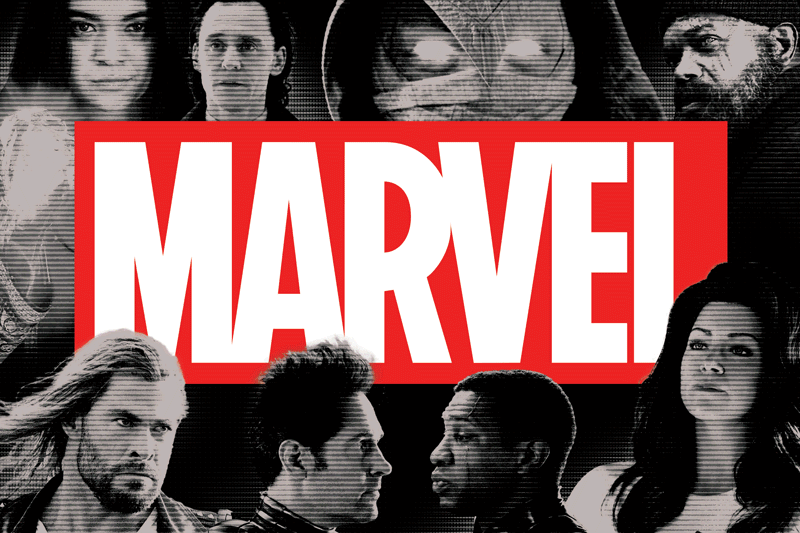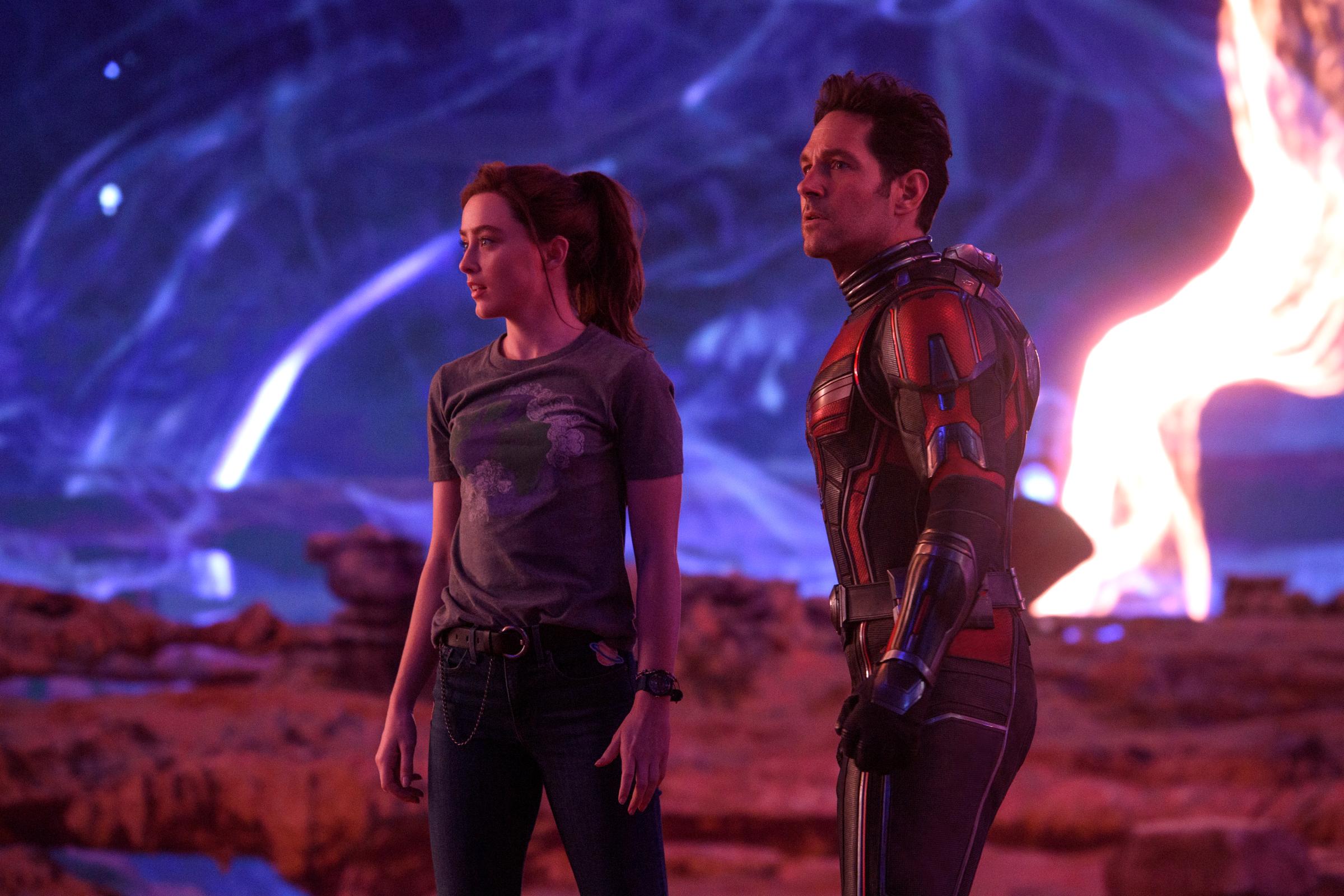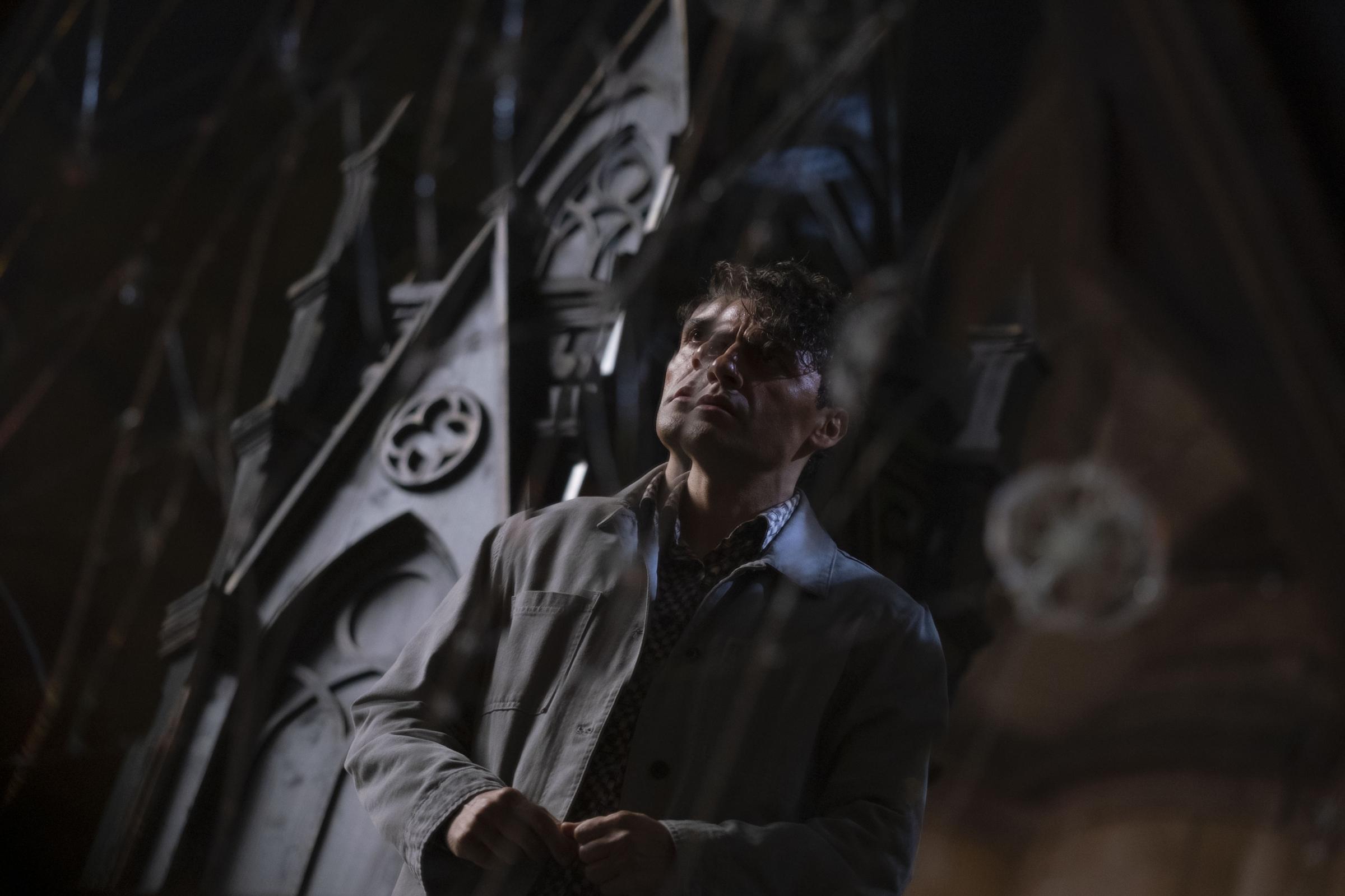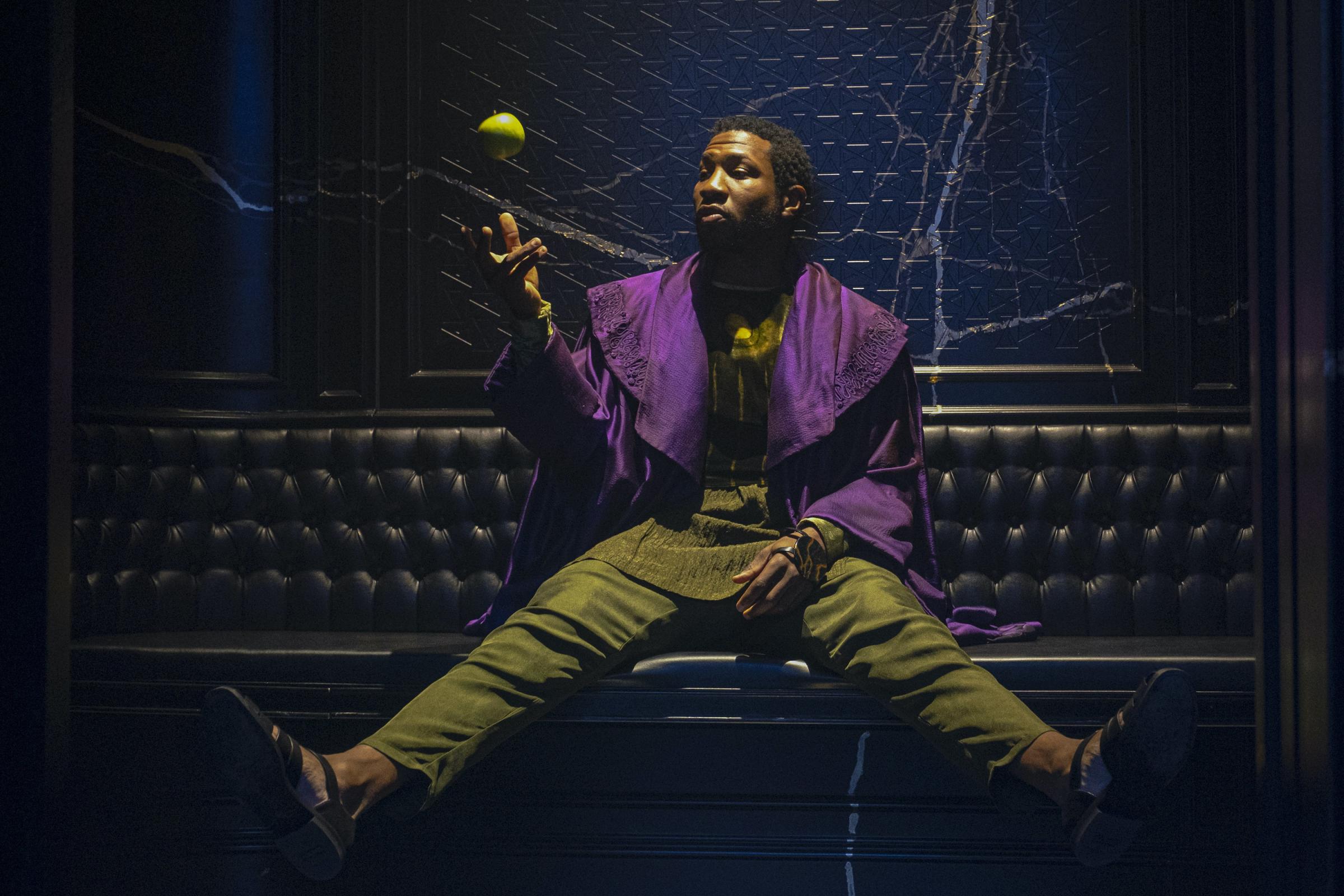
It is almost impossible to follow the plot of the first episode of Season 2 of Loki. I say this as someone who has been writing about the Marvel Cinematic Universe for a decade. I’ve seen every major Marvel release more than once, and have enjoyed most of them. I’ve also paid close attention to the events of Loki Season 1, Avengers: Endgame, and Ant-Man and the Wasp: Quantumania, all required viewing for this series. The characters spend most of the first episode explaining to the audience everything that happened in Season 1, which ended in one master timeline branching into many parallel timelines. Simultaneously they embark on vaguely related adventures.
Here's what I can divine from the episode: Loki (Tom Hiddleston), Mobius (Owen Wilson), and a new character named OB (Ke Huy Quan) are worried about the fact that Loki seems to be involuntarily traveling to different periods in time. Why? That is unclear. But they determine that they need to use a machine that looks like a big gun to rip all the different versions of Loki from infinite branching timelines in order to fix the problem. Why would this solve the problem? I do not know. Does that mean all other Loki variants cease to exist? Beats me. Oh, and they need to pull off this feat in under five minutes for...reasons.
Does all this sound like gobbledygook? For years now, audiences have not been able to watch Marvel shows and movies casually. But watching Loki Season 2, I felt I could not even look down at my phone for a second without getting completely lost. Heck, even if you’re watching with rapt attention, you’ll probably have a difficult time keeping up with the convoluted time travel shenanigans. The various MacGuffins, Easter eggs, and pseudoscientific explanations of superpowers used to be fun. Now they feel like homework.
Worse still, the recent MCU stories spend so much time explaining what's going on that they waste the incredible actors who have been unfortunately sucked into the Marvel machine. Just this year Olivia Colman, Bill Murray, Emilia Clarke, Will Poulter, and Kingsley Ben-Adir have all been tasked with reciting exposition rather than actually performing.
More From TIME
Read More: What to Remember Before Watching Loki Season 2
I'm not the only frustrated fan. Marvel Studios is losing viewers. Audiences used to line up to snag the best seats to the latest Avengers movie. Now they're queuing for Barbenheimer instead. Not long ago, Marvel movies usually snagged the top three or four spots on the list of highest-grossing films every year. This year at the global box office, Barbie, The Super Mario Bros. Movie, and Oppenheimer all outgrossed both Guardians of the Galaxy Vol. 3 and Ant-Man and the Wasp: Quantumania. In fact, Quantumania ranks all the way down at No. 10 for the year, performing below expectations. Tellingly, Quantumania had an impressive opening weekend, but ticket sales declined dramatically in the following weeks: A combination of poor reviews and bad word of mouth sunk sales.
But where Marvel has really faltered is on Disney+. Fans have complained so loudly that there are too many mediocre MCU shows that Marvel Studios head Kevin Feige has vowed to slow the churn. "It is harder to hit the zeitgeist when there's so much product out there—and so much 'content,'" Feige told Entertainment Weekly. "But we want...the MCU projects to really stand out and stand above. So, people will see that as we get further into Phase 5 and 6, the pace at which we're putting out the Disney+ shows will change so they can each get a chance to shine." Elsewhere in the Disney empire, CEO Bob Iger has announced that rather than doubling down on its streaming strategy, the company will be investing heavily in its parks.
Disney can't solely blame superhero fatigue for flagging interest in the MCU. After all, Sony's animated Spider-Man: Across the Spider-verse sold more tickets domestically than Guardians Vol. 3; it became Sony’s highest-grossing animated movie and the highest-grossing animated comic book movie ever. Amazon's dark parody of other superhero properties, The Boys, outperformed every single one of the MCU TV shows released in 2022, according to Nielsen, and just released a spin-off, Gen V. Make a great superhero property, and people will watch.
Perhaps the comedown was inevitable. Marvel reached such a high point with Avengers: Endgame in 2019 both critically and commercially that replicating that success, especially in the short term, was always going to be a near-impossible task. Still, the quality of the properties and buzz around new releases dropped so quickly that fans have been left wondering what, exactly, happened. Here are a few ways that the storytelling at Marvel Studios has gone wrong.
Trying to elevate B-list superheroes

The years following 2019's Avengers: Endgame were always going to be a rebuilding period for the MCU. The movie killed off Robert Downey Jr.'s Iron Man, the once-obscure superhero who effectively kicked off the golden years of the MCU in 2008. It also retired Chris Evans' Captain America, who arguably became the beating heart of the Avengers series. Chadwick Boseman, who was slated to star in Black Panther: Wakanda Forever and play a major role in the future of Marvel, tragically passed away in 2020. In quick succession, Marvel lost three of its biggest stars.
Then other actors started expressing their fatigue with the superhero lifestyle. Scarlett Johansson's Black Widow also met an untimely death in Endgame, though her solo feature, a prequel, suggested a future in which she might return in other films. But Johansson has said she's done with Marvel, a decision Disney probably hastened thanks to a very public fight over streaming residuals and COVID-era contract negotiations. Zoe Saldaña announced her retirement from the Guardians of the Galaxy franchise, while Spider-Man star Tom Holland and Thor actor Chris Hemsworth have both said they are taking breaks from moviemaking writ large, with no indication as to whether they will ever return to the MCU.
In short, Marvel's A-Team is gone. For the last several years, the studio has tried to elevate supporting players. It hasn't always worked well. Though Paul Rudd's smile is infectious, Ant-Man has never been quite as quippy as Spidey. Benedict Cumberbatch is a formidable actor, but Doctor Strange has always felt a bit like a low-rent Tony Stark—all the cockiness but not quite enough charm. Brie Larson's deadpan take on Captain Marvel doesn't seem to register with audiences in the same way as Chris Evans' earnest Captain America did. And while Letitia Wright admirably took the weight of Black Panther 2 on her shoulders after Boseman's passing, she is a decade younger and much less experienced than Boseman was when he made the role iconic. His shadow looms large.
The introduction of entirely new characters has not gone according to plan. The Eternals, which was meant to launch a whole new universe of cosmically-minded Marvel storytelling—and introduce Harry freakin’ Styles into the franchise!—was so underwhelming it's unclear if we'll see those characters in a movie again. The Blade reboot starring Mahershala Ali has been delayed for years, as has the yet-uncast Fantastic Four film. X-Men fans will likely have to wait a few more years for a reboot of that franchise.
It's difficult to see where the MCU is headed. Sure, we still get a post-credits scene at the end of every movie teasing whatever comes next. And we know for a fact that the next Avengers movie is titled Kang Dynasty, which suggests Jonathan Majors' villain character from Loki and Quantumania will do something so dastardly that all the remaining Marvel superheroes will need to team up to stop him. (Of course, that assumes that Majors remains with the franchise. When Marvel cast him as Kang in 2021, he was a promising young star. Earlier this year, he was arrested for assault, on charges to which he has pleaded not guilty. He has a court date set for later this month.)
Read More: Here's a Complete List of Upcoming Marvel Movies
There are so many new characters, plot threads, and timelines: Recent end-credits scenes have teased new heroes and villains played by Charlize Theron, Kit Harington, and Styles, just to name a few. The idea that these dozens of characters could be jammed together into one film seems ludicrous. The movies need to start focusing on quality, not quantity, of superpeople.
Too many shows, too few risks

Marvel shows are most successful when they're experimental in their storytelling and use their longer run times to explore character instead of action—in short, when they can do things that the movies cannot do. WandaVision explores Wanda's grief over the death of her lover Vision in a more nuanced way than, say, Doctor Strange in the Multiverse of Madness could in its short runtime. The movie flattens Wanda (Elizabeth Olsen) into an angry mom trope, undoing much of the good work of the show and upsetting some fans. (Olsen herself expressed frustration with the character's portrayal.)
WandaVision also stands out for its high-concept structure with each new episode imitating a different era of television, from I Love Lucy to Modern Family. The episodes kept viewers glued to their screens and trying to search for Easter eggs to solve the greater mystery of how Wanda ended up in a sitcom world. Similarly, She-Hulk shined when it riffed on its Ally McBeal premise of a lovelorn lawyer and fell to pieces when it got too caught up in Jennifer Walters smashing things.
Read More: WandaVision Deserves the Hype. But It Penalizes Casual Marvel Viewers
The best portions of Falcon and the Winter Soldier unpack why Sam is hesitant to take up the Captain America mantle and how his qualms are influenced by larger cultural questions of race and power. Loki shines when it focuses on Loki's love life, from his groundbreaking bisexual identity to his semi-romantic relationship to his parallel universe female self, Sylvie, not on explaining the various aspects of time travel. Marvel shows get lost when they revert to the formula: Every movie and show must end with some epic, magical battle.
And every show ends that way—even the good ones. The magical battle in the final episode of WandaVision was tonally dissonant from the dramedy that came before. Moon Knight promised a wacky story centered on a hero with multiple personalities (Oscar Isaac with an absurd British accent) and a bad guy who drops shards of glass into his shoes for kicks (Ethan Hawke entering the genre he's long critiqued). But despite snagging two of the greatest working actors for the inevitable hero-villain face-off, their confrontation bores.
Those effects-heavy face-offs also look bad. Marvel is well-aware of the problem. The last episode of She-Hulk even critiques the boring, ill-rendered CGI battles that have become a mainstay of most Marvel shows. Disney+ series are rarely granted the budgets of feature films. And Marvel has come under fire from VFX artists in recent years for demanding too much on too short a timeline. The sheer number of projects they're pumping out is unsustainable and the poor results are showing up onscreen. In the past month, Disney and Marvel visual effects workers voted to unionize.
The studio is trying to find a solution: It announced that Armor Wars, a project that will no doubt feature several expensive face-offs between various Iron Men, is getting upgraded from a TV show to a movie—and a movie-sized budget. Eventually, they must figure out which stories belong on Disney+ and which belong on a big screen.
An incredibly convoluted parallel timeline plot

There was a brief moment when I enjoyed Marvel's time travel shenanigans. How, exactly, did the Avengers jump through space-time to collect all the Infinity Stones in Avengers: Endgame? I had answers! And I loved digging into the details.
In retrospect, a brief scene in that movie in which Tilda Swinton's the Ancient One tells Mark Ruffalo's Hulk that meddling in the past can create branching timelines in the MCU should have been a warning sign. Instead of yada-yada-ing away the various timeline theories in order to quickly usher in characters from other universes—like the X-Men and Fantastic Four heroes that Disney finally got their hands on during the 20th Century Fox acquisition—Marvel Studios leaned into convoluted explanations of how all these various timelines interact. Deciphering the plots has become exhausting.
Read More: Everything You Need to Know About Loki and Time Travel in the MCU
I'm still not clear on how to reconcile the fact that multiple Spider-Men from parallel universes fight together in Spider-Man: No Way Home with the notion that there was once a single master timeline that broke into several branching timelines in Season 1 of Loki. Or when Quantumania is set relative to the events of Loki, when both stories seem to take place in a world where the concepts of time and space are warped. It feels like you need a degree in theoretical physics to follow it all, and I suspect even if you had one, the storylines still would not cohere.
Lost among these time-jumping, space-spanning sagas are more grounded stories of earnest characters like Peter Parker and Steve Rogers demonstrating the small acts of super-heroism to protect Queens and Brooklyn, respectively, that presage their eventual rise to Avengers status. In theory, shows like Ms. Marvel (set nearby in Jersey City) and Hawkeye (in which Hawkeye and his protege Kate Barton sling arrows to fight a Manhattan gangster) are supposed to be telling these street-level stories that drew so many to the MCU in the first place. But too often these stories are constantly interrupted and derailed by otherworldly cameos and subplots designed to set up the next big movie.
In fairness to Marvel, the MCU was not built in a day: The early years of the franchise featured plenty of missteps too. Remember the stunning bore Thor: The Dark World? But four years into the post-Endgame experiment, Marvel ought to have built out a better foundation for what is to come and introduced a compelling cadre of characters to lead us into the next phases of the MCU. Instead, we're left rewinding Ke Huy Quan's monologues in Loki trying to figure out what characters exist in which timelines and how many of them are there (dozens? hundreds?) who will need to fight Kang the Conquerer. Or, more to the point, do we even still care who even wins that battle?
More Must-Reads From TIME
- The 100 Most Influential People of 2024
- Coco Gauff Is Playing for Herself Now
- Scenes From Pro-Palestinian Encampments Across U.S. Universities
- 6 Compliments That Land Every Time
- If You're Dating Right Now , You're Brave: Column
- The AI That Could Heal a Divided Internet
- Fallout Is a Brilliant Model for the Future of Video Game Adaptations
- Want Weekly Recs on What to Watch, Read, and More? Sign Up for Worth Your Time
Write to Eliana Dockterman at eliana.dockterman@time.com